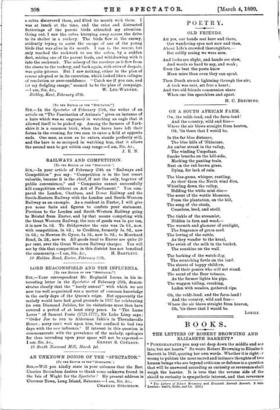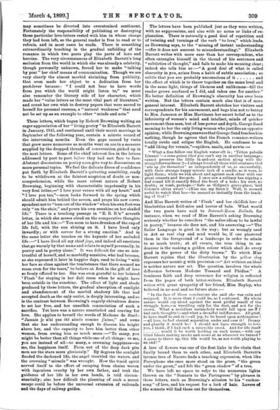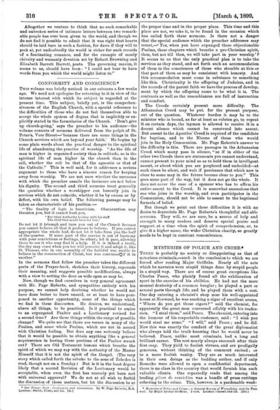BOOKS.
THE LETTERS OF ROBERT BROWNING AND ELIZABETH BARRETT.* "POMEGRANATES you may cut deep down the middle and ace into, but not hearts." So wrote Robert Browning to Elizabeth Barrett in 1845, quoting her own words. Whether it is right or wrong to publish the most sacred and intimate thoughts of two human beings who are beyond criticism or defence is a question that will be answered according as curiosity or reverence shall weigh the heavier. It is true that the reverse side of the shield to curiosity is sympathetic interest, and that reverence
• The Letters of Robert Browning and Elisahdh Barrett Barrett. 2 vols. London: Smith, Elder, and Co. [21.3 may sometimes be diverted into overstrained sentiment. Fortunately the responsibility of publishing or destroying these particular love-letters rested with him in whose charge they had been left, so the general reader is free to read or to refrain, and in most cases he reads. There is something extraordinarily touching in the gradual unfolding of the romance in which two poets play the parts of hero and heroine. The very circumstances of Elizabeth Barrett's long seclusion from the world in which she was already a celebrity, though personally unknown, forced her to make "talking by post" her chief means of communication. Though we see very clearly the almost morbid shrinking from publicity, that even made her object to a dedication from her poet-lover because : "I could not bear to have words from you which the world might listen to," we must also remember the literary side of her character, which made her "value letters as the most vital part of literature," and count her own wish to destroy papers that were sacred to herself for personal reasons, a "natural weakness" that need not be set up as an example to other " minds and acts."
These letters, which began by Robert Browning writing an eager appreciation of her" living poetry" to Elizabeth Barrett in January, 1845, and continued until their secret marriage in September of the following year, contain a minute record of the intervening months. Even the gaps caused by visits that grew more numerous as months went on are in a measure supplied by the dropped threads of conversation picked up in the next letters. Some of the chief interest lies in the letters addressed by poet to poet before they had met face to face. Abstract discussions on poetry soon give way to discussions on more personal topics. We feel the delicate fibres of confidence put forth by Elizabeth Barrett's quivering sensibility, ready to be withdrawn at the faintest suspicion of doubt or non- comprehension, while the more robust nature of Robert Browning, beginning with characteristic impetuosity in his very first letter,—" I love your verses with all my heart," and " I love you too,"—soon looks forward to the spring which should admit him behind the screen, and prays his new corre- spondent not to "lean out of the window" when his own foot was only "on the stair," and pours his own sunshine on her shaded life." There is a touching passage in "E. B. B.'s" seventh letter, in which she muses aloud on the comparative thoughts of her life and his :—" You seem to have drunken of the cup of life full, with the sun shining on it. I have lived only inwardly; or with sorrow for a strong emotion." And in the same letter she touches on the keynote of her secluded life :—" I have lived all my chief joys, and indeed all emotions that go warmly by that name and relate to myself personally, in poetry and in poetry alone." It was difficult for one so mis- trustful of herself, and so morbidly sensitive, who had become, as she expressed it later in happier days, used to living "with her face so close against the tombstones that there seemed no room even for the tears," to believe at first in the gift of love so freely offered to her. She was even grateful to her beloved 'Flush' for staying in her dull room when he might have been outside in the sunshine. The effect of light and shade produced by these letters, the gradual absorption of sunlight and abandonment of the morbid shadowy life that had accepted deathas the only outlet, is deeply interesting, and so is the contrast between Browning's eagerly-chivalrous desire to set her free, and her unselfish renunciation of such a sacrifice. Yet hers was a nature unsatisfied and craving for
love. She applies to herself the words of Madame de Stael : "Jamais je n'ai pas ete aimee comme j'aime," and owns that she has understanding enough to discern his height above her, and the capacity to love him better than other women, from owing him so much more :—" To many, you might be better than all things while one of all things : to me, you are instead of all—to many, a crowning happiness—to me, the happiness itself. From out of the deep dark pits men see the stars more gloriously." By degrees the sunlight flooded the darkened life, the angel troubled the waters, and the crowning " miracle " was wrought. How the timid spirit nerved itself to the effort of escaping from chains woven with ingenious cruelty by her own father, and took the guidance of her life in her own hands, is told circum- stantially; also how difficult the planning of such a secret escape could be before the universal extension of railroads and the days of railway guides. The letters have been published just as they were written, with no suppressions, and also with no notes or links of ex- planation. There is naturally a good deal of repetition and of twisting and turnings of the verb "to love," which leads, as Browning says, to the "missing of instant understanding —(for it does not amount to misunderstanding)." Elizabeth Barrett writes with more ease than her correspondent, who often entangles himself in the thread of his sentences and "subtleties of thought," and fails to make his meaning clear; indeed she tells him so :—" A good deal of what is called obscurity in you, arises from a habit of subtle association; so subtle that you are probably unconscious of it and
the effect of whieh is to throw together on the same level and in the same light, things of likeness and unlikeness—till the reader grows confused as I did, and takes one for another."
No better definition of Browning's obscurity has ever been written. But the letters contain much also that is of more general interest. Elizabeth Barrett sketches her visitors and correspondents for his amusement, and begs him not to betray to Mrs. Jameson or Miss Martineau her secret belief as to the inferiority of women's mind and intellect, minds of quicker movement than men, but of less power and depth, George Sand seeming to her the only living woman who justifies an opposite opinion; while Browninganswers that George Sand teaches him nothing, though he agrees that the French romance-writers totally outdo and eclipse the English. He confesses to an "odd liking for vermin,"—spiders, snails, and newts :—
"What a fine fellow our English water-eft is ; Triton paludie Linnaei '—e come guizza (that you can't say in another language ; cannot preserve the little in-and-out motion along with the straightforwardness !)—I always loved all those wild creatures God sets up for themselves so independently of us, so successfully, with their strange happy minute inch of a candle, as it were, to light them ; while we run about and against each other with our great cresseta and fire-pots. I once saw a solitary bee nipping a leaf round till it exactly fitted the front of a hole ; his nest, no doubt ; or tomb, perhaps= Safe as (Edipus's grave-place, 'mid Colone's olives swart'—(Kiss me, my Siren !) Well, it seemed awful to watch that bee—he seemed so instantly from the teach- ing of God !"
And Miss Barrett writes of 'Flush' and her childish love of
bluebottles and field-mice and horror of bats. What would the two poets have said to Barrack-Boons Ballade, for instance, when we read of Miss Barrett's asking Browning seriously whether he considers "the sailor-idiom to be lawful in poetry," because she does not, and his answering :—" The
Sailor Language is good in its way ; but as wrongly used in Art as real clay and mud would be, if one plastered them in the foreground of a landscape in order to attain
to so much truth; at all events, the true thing to en- deavour is the making a golden colour which shall do every good in the power of the dirty brown." To which Miss Barrett rejoins that the illustration by the yellow day expresses her meanir g with precision :—" Art without an ideal is neither nature nor art. The question involves the whole difference between Madame Tussaud and Phidias." A
luminous faith and deep reverence for religion is reflected from the pages of both letter-writers. Elizabeth Barrett writes with great sympathy of her friend, Miss Bayley, who believed in no soul and no future state :—
" In the face of those conclusions she said she was calm and resigned. It is more than I could be, as I confessed. My whole nature would cry aloud against the most pitiful result of the struggle here,—a wrestling only for the dust, and not for the crown. What a resistless melancholy would fall upon me it I had such thoughts !—and what a dreadful indifference. All grief, to have itself to end in !—all joy, to be based upon nothingness —all love, to feel eternal separation under and over it ! Dreary and ghastly it would be ! I should not have strength to love you, think, if I had such a miserable creed. And for life itself . . . . . . would it be worth holding on such terms,—with our blind Ideals making mocks and mows at us wherever we turned ? A game to throw up, this life would be, as not worth playing to an end !"
A love of flowers was one of the first links in the chain that finally bound them to each other, and Elizabeth Barrett's intense love of Nature finds a touching expression, when like Persephone she once more stood on the grass, "the green under the green," and felt the "green shadow" of a tree.
We have left no space to refsr to the numerous lights thrown on the "Sonnets to the Portuguese" by phrases in
these letters, such as Browning's allusion to his " cuckoo- song " of love, and his request for a lock of hair. Lovers of the sonnets will find these out for themselves.
Altogether we venture to think that no such remarkable and unbroken series of intimate letters between two remark- able people has ever been given to the world, and though we do not find it possible to admit that it was right that hearts should be laid bare in such a fashion, for daws if they will to peck at, yet undoubtedly the world is richer for such records of a fascinating romance, and for the example of manly chivalry and womanly devotion set by Robert Browning and Elizabeth Barrett Barrett, poets. The governing maxim, it seems to us, should have been : "I could not bear to have words from you which the world might listen to."








































 Previous page
Previous page